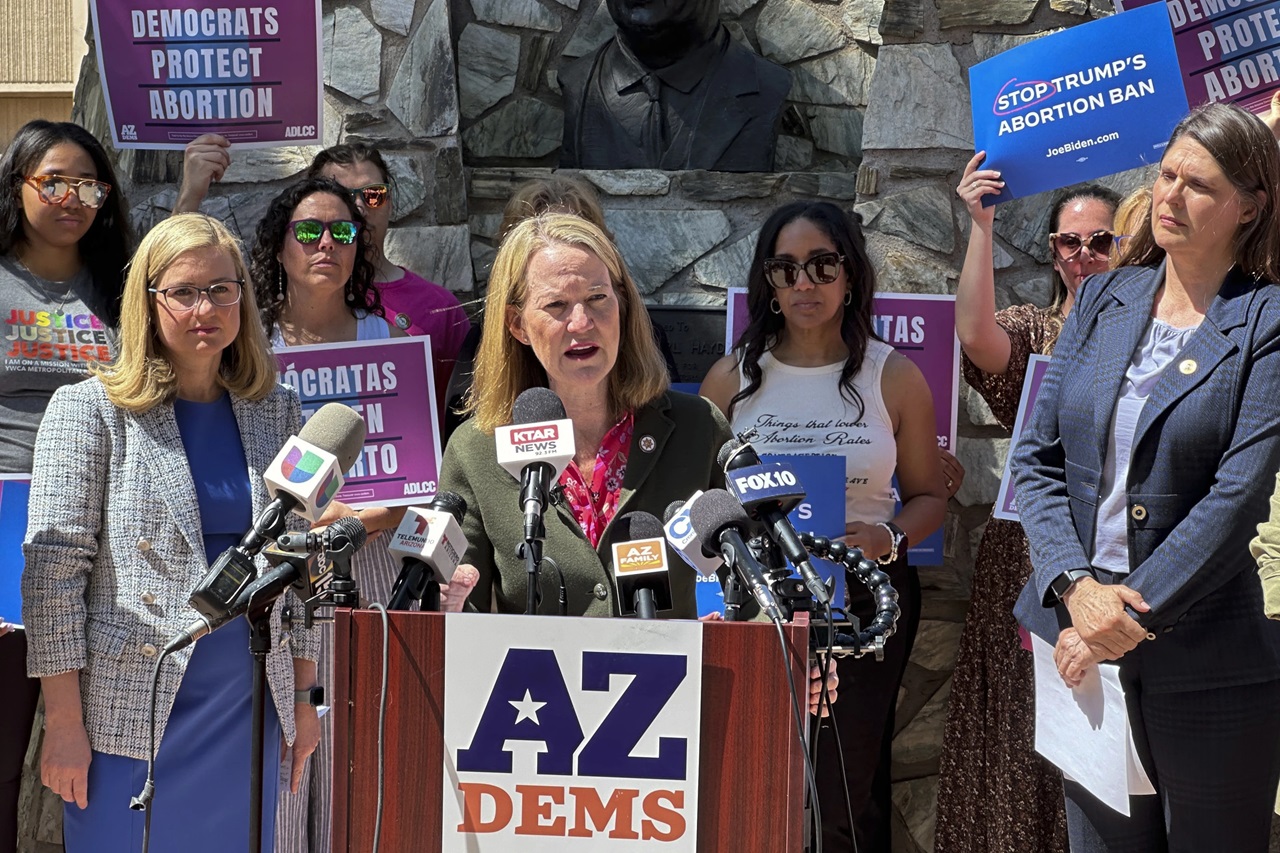
PHOENIX—Arizona’s complete abortion ban, enacted in 1864 during the Civil War, when Arizona was still a territory, became politically white-hot after the state Supreme Court reinstated it on April 9.
A white judge, William Thomas Howell, known for relationships with and even marriages to underage girls, wrote the law in question before the Civil War when women did not have the right to vote and Arizona was not yet a state. Howell openly admitted to having an affair with and then marrying a 12-year-old Mexican girl and, when he left the Court and moved to Hawaii, he began a relationship with an 11-year-old Hawaiian Native girl.
Attacks on abortion rights in the late 1800s were connected to racism and white supremacy. The eugenics movement stirred fears of the so-called loss of white identity. In the late 1800s, increased immigration, especially of Catholic immigrants, and the declining birth rate among U.S.-born white Protestant women, encouraged efforts to criminalize abortion. White doctors often targeted Black midwives for particular condemnation.
Obtaining an abortion depended upon your race and finances. If one could locate a willing doctor the normal thing was to have to pay high fees. Poor and minority women then suffered discrimination and were often in the hands of incompetent or dangerous practitioners.
The “new” law which could be in effect in just weeks in Arizona brings back all the horrific elements of what the right often calls the “good old days.”
The results in Arizona: Massive numbers are on the march in Tucson. Doctors at the state’s leading abortion clinic, in Phoenix, said they feared for patients’ lives. State Republicans scrambled to avoid the political fallout, with U.S. Senate nominee Kari Lake openly flip-flopping every which way from the total ban she advocated when she ran for governor two years ago.
The state House of Representatives erupted into chaos and repeated shouts of “Shame! Shame!” from female Democratic lawmakers when the Speaker—a white Republican man operating in the tradition of Judge Howell—gaveled the April 10 session to a close to prevent the repeal of the abortion ban from coming to the floor.
House Republican whip, Teresa Martinez, R-Casa Grande, hewed to the party’s anti-abortion line and chided Democrats for “rushing” the issue. Abortion, she said, is not health care.
“We’ve got the eyes of the world watching Arizona right now,” retorted Rep. Stephanie Stahl Hamilton, D-Tucson. “We know that the Supreme Court decision yesterday is extreme. And we know that should the 1864 ban on abortion remain a law in Arizona, people will die.”
“The legislature demonstrated its consistent design to restrict elective abortion to the degree permitted by the Supremacy Clause and an unwavering intent since 1864 to proscribe elective abortions absent a federal constitutional right,” the state Supreme Court majority said, in Justice John Lopez’s decision.
The 1864 ban also bans doctors from two to five years for performing “illegal” abortions.
The Arizona uproar again reminds the nation that the U.S. Supreme Court’s Dobbs decision two years ago shoved abortion right back into the hands of the states. Donald Trump-named right-wing justices Brett Kavanaugh, Neil Gorsuch, and Amy Coney Barrett provided the key majority votes for Dobbs.
Dobbs led Republican-controlled legislatures and governors to outlaw abortion, blue states to become havens for women—and in Idaho’s case, havens for doctors, too—fleeing total bans and criminal sanctions, and a widespread revolt at the polls which shows no signs of cooling.
And that is important in key swing states, including Arizona, where state constitutional rights to abortion, or in a few states a ban on abortions, will be on the ballot this fall. The petition to enshrine abortion rights in the Arizonan constitution needs 383,923 valid signatures, gathered by Independence Day, to qualify. They’re aiming for half a million.
An amendment in Nevada too
In swing state Nevada, where abortion up to six months has been fully legal for three decades, an amendment to enshrine that in the state constitution needs 102,000 signatures by late June.
The presidential race will again be close in newly purple Arizona, which also features a U.S. Senate race between Democratic incumbent Mark Kelly and Trumpite Republican Lake, several open U.S. House seats, both houses of the narrowly Democratic legislature and retention elections for two of the state Supreme Court justices, both Republicans.
Abortion may be on the ballot in purple Pennsylvania. And even in deep-blue states—like New York—or deep-red ones, like Montana, abortion rights amendments could boost progressive turnout and swing down-ballot races, just as abortion rights referendums did two years ago.
Democratic President Joe Biden sharply criticized the Arizona court’s ruling upholding the long-outdated law. His Republican foe in this fall’s election, Donald Trump, echoed the three Supreme Court justices he appointed while he inhabited the Oval Office, saying abortion should be left to the states. Naming those justices carried out a Trump campaign promise to anti-abortionists.

Three years ago, Trump narrowly lost key swing state Arizona to Biden, with rabid Trumpites ringing the arena where ballots were being counted, threatening violence unless their god won—all on top of a voter suppression law the Republican-named U.S. Supreme Court justices upheld earlier.
Arizona’s flip was the first electoral sign Trump would lose to Biden then, and enraged him. His rage about fraud there was a stage in his plans to retain the Oval Office despite the election’s outcome, by ordering and abetting his acolytes’ coup d’état attempt at the U.S. Capitol three months later.
Reinstatement of Arizona’s complete abortion ban won’t take effect for at least two weeks, and possibly for two months, Planned Parenthood of Arizona said. And the state Attorney General, Democrat Kris Mayes, plans not to enforce the Civil War-era law.
“Planned Parenthood Arizona still will be able to serve abortion patients for several more weeks, the state will soon lose access to abortion except in the most limited circumstances,” the organization said. The ancient law’s only exception is to save the life of the pregnant woman, and there are even restrictions on that.
Planned Parenthood Arizona chief medical officer Dr. Jill Gibson told ABC News patients asked “How could this possibly be that legislators and politicians are determining whether or not they can have this healthcare procedure.”
She also said the criminal penalties will deter doctors from performing abortions and deter medical students from coming to Arizona for training, such as residencies. Gibson did not speculate on whether doctors would flee Arizona, transferring their practices to neighboring states where abortion is legal.
That’s what’s happening in Idaho, where the Dobbs decision and the deep-red state government produced an identical absolute abortion ban. Doctors have decamped for Spokane, Wash., and eastern Oregon.
“I plan to follow the law, but what I can say is I will absolutely never stop fighting until we can restore the right to bodily autonomy in this state and across the country,” Gibson told ABC.
We hope you appreciated this article. At People’s World, we believe news and information should be free and accessible to all, but we need your help. Our journalism is free of corporate influence and paywalls because we are totally reader-supported. Only you, our readers and supporters, make this possible. If you enjoy reading People’s World and the stories we bring you, please support our work by donating or becoming a monthly sustainer today. Thank you!













Comments